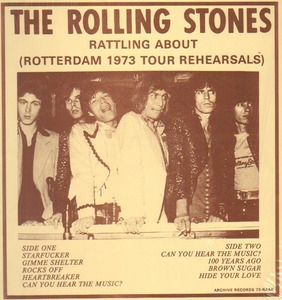Fact #146476
When:
Short story:
 The Rolling Stones begin rehearsals in Rotterdam, The Netherlands, Europe, for their upcoming European tour.
The Rolling Stones begin rehearsals in Rotterdam, The Netherlands, Europe, for their upcoming European tour.Full article:
Brian Croft (Director, ESP, touring company) : It was decided to use the same basic set-up for the '73 tour as used on the '72 States tour, and that I should get it together in England, and Chip Monk (production manager) come over at a later stage.
We started with a lot of gear which was in store in Yonkers, New York, some of which was rented. It all came together in Rotterdam where The Stones were rehearsing.
Later, Chip bowed out and I became completely responsible, as production and stage manager. Apart from the PA (organised by Tychobrahe of Los Angeles) ESP handled all the equipment hiring and purchasing, doing it almost like a sub-contracted job for Peter Rudge';s Five-One Productions. It wasn't a straight sub-contract though, because road expense and crew salaries were paid by Five-One and The Stones.
The Stones' contract, which is Peter Rudge's forte, is really amazing - nine pages long with a 14-page technical rider. It covers everything, like, 'The Purchaser must provide X kilos of dry ice, 12 dozen roses' - because Mick does a baptismal thing at the end with rose petals and water on the front rows of the audience - 'two meals a working day for the producer and road crew, 10 local labour guys and two fork-lift trucks' and a lot of technical things.
They're all contractural points so, legally, if something's not there, you can say the contract has been broken and they're not going on - but nobody ever gets that heavy, of course. It's just a good way of making sure everything is going to be all right, so Mick can hit the same stage every day, the road crew can arrive and everything's there that they need. It's a very professional way to do things.
(Source : interview in Beat Instrumental, December 1973)
Tweet this Fact
We started with a lot of gear which was in store in Yonkers, New York, some of which was rented. It all came together in Rotterdam where The Stones were rehearsing.
Later, Chip bowed out and I became completely responsible, as production and stage manager. Apart from the PA (organised by Tychobrahe of Los Angeles) ESP handled all the equipment hiring and purchasing, doing it almost like a sub-contracted job for Peter Rudge';s Five-One Productions. It wasn't a straight sub-contract though, because road expense and crew salaries were paid by Five-One and The Stones.
The Stones' contract, which is Peter Rudge's forte, is really amazing - nine pages long with a 14-page technical rider. It covers everything, like, 'The Purchaser must provide X kilos of dry ice, 12 dozen roses' - because Mick does a baptismal thing at the end with rose petals and water on the front rows of the audience - 'two meals a working day for the producer and road crew, 10 local labour guys and two fork-lift trucks' and a lot of technical things.
They're all contractural points so, legally, if something's not there, you can say the contract has been broken and they're not going on - but nobody ever gets that heavy, of course. It's just a good way of making sure everything is going to be all right, so Mick can hit the same stage every day, the road crew can arrive and everything's there that they need. It's a very professional way to do things.
(Source : interview in Beat Instrumental, December 1973)